#RetailData
Explore tagged Tumblr posts
Text
Retail Data Insights: Unlocking the Power of Information
In today's data-driven retail landscape, companies are leveraging vast amounts of information to gain critical insights and drive decision-making. This blog delves into several key areas where retail businesses are harnessing data to derive powerful insights and enhance reporting capabilities.
Customer Behavior Analysis
Retailers are combining point-of-sale data with loyalty program information to create comprehensive customer profiles. This multifaceted analysis can reveal:
Basket Composition: Identifying frequently paired items helps retailers understand common purchasing patterns, enabling strategic product placement and bundling to boost sales.
Purchase Frequency: By understanding how often customers shop and the timing of their purchases, retailers can tailor marketing efforts and optimize inventory levels to meet demand.
Price Sensitivity: Analyzing how different customer segments respond to promotions allows retailers to implement personalized pricing strategies and improve conversion rates.
These insights are invaluable for predicting customer churn based on changes in shopping patterns, enabling targeted retention strategies that enhance customer loyalty and lifetime value.
Inventory Management
Efficient inventory management is crucial in retail, and data plays a pivotal role in achieving this. Real-time dashboards provide visibility into stock levels across multiple locations, offering insights such as:
Stock Turnover Rates by Product Category: Understanding how quickly products sell helps retailers maintain optimal inventory levels, reducing the risk of stockouts or overstock situations.
Seasonal Demand Fluctuations: Analyzing historical sales data allows retailers to anticipate seasonal trends and adjust inventory accordingly.
Optimal Reorder Points: Setting precise reorder points minimizes stockouts and excess inventory, ensuring that popular items are always available while reducing carrying costs.
Advanced retailers are leveraging machine learning algorithms to predict demand for new product launches, improving the accuracy of initial stock allocations and reducing the likelihood of excess inventory.
Store Performance Metrics
Comparing performance across different store locations yields valuable insights that drive operational improvements. Key metrics include:
Sales per Square Foot: Measuring revenue generated per square foot helps retailers optimize store layouts and product placement for maximum profitability.
Conversion Rates: Understanding the percentage of store visitors who make a purchase provides insights into customer behavior and the effectiveness of sales strategies.
Average Transaction Value: Analyzing the average amount spent per transaction helps retailers identify opportunities to increase sales through upselling and cross-selling.
Staff Productivity: Monitoring staff performance metrics enables retailers to implement best practices and training programs that enhance customer service and operational efficiency.
By identifying top-performing stores and analyzing their practices, retailers can implement proven strategies across their network, potentially increasing same-store sales and overall profitability.
Marketing Campaign Effectiveness
Data allows retailers to measure the impact of marketing efforts across multiple channels, providing a holistic view of campaign performance. Key areas of analysis include:
Email Campaigns: Tracking open rates, click-through rates, and conversion rates helps retailers refine their email marketing strategies for maximum effectiveness.
Social Media Ads: Analyzing engagement metrics and ROI for social media advertising campaigns enables retailers to allocate budgets more efficiently and target the right audience.
In-Store Promotions: Evaluating the success of in-store promotions through sales lift and customer feedback helps retailers design more impactful promotional activities.
Mobile App Notifications: Monitoring the effectiveness of push notifications in driving app engagement and sales provides insights into customer preferences and behavior.
By analyzing conversion rates and ROI of different marketing channels, companies can optimize their marketing spend, enhance customer engagement, and increase overall campaign effectiveness.
Pricing Optimization
Price elasticity is a complex but crucial aspect of retail strategy. Advanced analytics can help retailers in several ways:
Identifying Price Thresholds: Understanding the price points at which demand significantly changes allows retailers to set competitive prices that maximize sales and profitability.
Cross-Price Elasticity: Analyzing the relationship between the prices of related products helps retailers optimize their pricing strategies and avoid cannibalizing sales.
Markdown Strategies: Implementing data-driven markdown strategies for clearance items ensures that retailers clear inventory efficiently without sacrificing too much margin.
Some retailers are adopting dynamic pricing for e-commerce platforms, leveraging real-time data to adjust prices based on demand, competition, and other factors. This approach can lead to significant increases in profit margins and enhanced competitiveness.
Supply Chain Analytics
Efficient supply chain management is critical for retail operations, and data-driven insights are key to achieving this. End-to-end visibility of the supply chain provides valuable information on:
Supplier Performance Metrics: Evaluating supplier reliability, lead times, and quality helps retailers build stronger partnerships and negotiate better terms.
Transportation Costs and Efficiency: Analyzing logistics data allows retailers to optimize shipping routes, reduce transportation costs, and improve delivery times.
Warehouse Utilization Rates: Monitoring warehouse operations helps retailers identify inefficiencies, streamline processes, and maximize storage capacity.
By identifying bottlenecks and inefficiencies, retailers can reduce lead times, cut logistics costs, and enhance overall supply chain performance.
Customer Sentiment Analysis
Grasping customer sentiment is essential in today's digital era. Text analytics projects can mine insights from various sources, including:
Customer Reviews: Analyzing reviews helps retailers identify common themes and areas for improvement, enhancing product development and customer service.
Social Media Mentions: Monitoring social media activity provides real-time insights into customer perceptions and trends, enabling timely responses to issues and opportunities.
Customer Service Interactions: Evaluating interactions with customer service teams helps retailers understand pain points and improve service quality.
By categorizing and quantifying customer feedback, retailers can quickly identify emerging issues, make data-driven decisions, and improve customer satisfaction.
Conclusion
The wealth of data available to retail companies today is truly staggering. The key lies in asking the right questions and using appropriate tools to extract meaningful insights. Data-driven decision-making has the power to transform retail operations, from enhancing the customer experience to optimizing supply chain efficiency.
As advancements in AI and machine learning continue, the potential for data to drive retail innovation seems limitless. Retailers who effectively harness these insights will be well-positioned to thrive in an increasingly competitive marketplace, turning information into a powerful asset for growth and success.
Contact Us For More Details Or Email Us @ [email protected]
#xequalto#DataModeling#RetailAnalytics#BusinessIntelligence#RetailData#DataDriven#CustomerInsights#CustomerBehavior#InventoryManagement#StorePerformance#MarketingAnalytics#PricingOptimization#SupplyChainAnalytics#RetailInnovation#MachineLearning#AIInRetail#DataScience#RetailStrategy#Ecommerce#RetailGrowth
0 notes
Text

Kentrix is a powerful business intelligence enabler, operating on data of 91.5 crores of Indian Consumers. Our precise lifestyle data can be used to get actionable insights to companies across industries, from eCommerce to retail to insurance and financial services.
#locationanalytics#storelocator#ConsumerBehavior#IndianShopper#LifestyleSegmentation#EconomicSegmentation#RetailData#RetailInsights#Kentrix#KentrixInsights
0 notes
Text
Data Monetization Strategies for Retailers

Written By: Gargi Sarma
Retailers are sitting on a treasure of data in today's data-driven society. Retailers can improve customer experiences, open up new revenue streams, and gain a competitive edge by utilizing this data. Here, we examine several data monetization tactics that merchants might use, backed by actual cases.
For retailers, data is the new gold. They gather a ton of data on demographics, spending patterns, and client behavior. Strategic exploitation of this data can be a goldmine for creating new revenue sources.

Figure 1: Key Data Sources and Monetization Strategies
Market Insights:
Global Data Monetization Market:
The global data monetization market size was valued at USD 2.99 billion in 2023.
It is projected to be worth USD 3.47 billion in 2024 and is expected to reach USD 11.83 billion by 2032.
The market is exhibiting a CAGR of 16.6% during the forecast period.
Retail Component:
The e-commerce and retail segment constitutes approximately 11% of the total data monetization market.
This segment is forecasted to show a compound annual growth rate (CAGR) of 36% from 2016 to 2023.

Figure 2: Regional View of Data Monetization (Source: Technavio)
Emerging Trends:
Private Data Demand: Emerging industries are increasingly demanding private data and analytics, driving the need for data monetization.
Edge Computing: Trends such as Big Data, Artificial Intelligence (AI), and the Internet of Things (IoT) are boosting the demand for edge computing software architecture.
Real-Time Analytics: Chief officials recognize the immense value of real-time data analytics, further fueling the market for private data.
Reasons for Retailers to Profit from Data:
Open up new revenue streams: Data can be sold to suppliers as insights, utilized to create loyalty programs, or targeted advertising.
Improved decision-making: Product placement, inventory control, and targeted marketing efforts can all benefit from data.
Data Monetization Strategies:
Selling Insights to Brands: Retailers have access to valuable information about who purchases what goods, where, and when. When seeking to comprehend market dynamics, brands—especially new ones—need to know this information. When a new product, like laundry baskets, is introduced to the market, a brand may not be aware of who is buying what kinds of laundry baskets, how sensitive they are to price, or how the market is competing. Retailers can profit from these data by helping firms make well-informed choices on new product launches, price policies, and advertising campaigns.
Creating Loyalty Programs: Retailers can create customized loyalty programs by utilizing their data. They are able to provide their consumers with individualized discounts and rewards by examining their purchasing habits and preferences. This improves consumer satisfaction and retention while offering an additional avenue for data collecting, hence expanding the retailer's database.
Target Advertising: Retailers can use their data to provide companies with extremely focused advertising options. Retailers may better assist companies in reaching their target audience by helping them understand customer demographics and purchase behaviors. To boost conversion rates, a new skincare company might, for example, aim advertisements just at consumers who have already bought skin care goods.
Optimizing Product Placement and Inventory Control: Retailers can improve inventory control and product positioning with the aid of data analytics. Retailers may cut waste and boost sales by stocking the correct products in the right locations by knowing which products are popular in certain areas. Additionally, this data-driven strategy aids in more effective inventory management and demand prediction.
Conclusion:
Retailers today have access to a wealth of data that might significantly boost consumer happiness and revenue development. Retailers may enhance their competitiveness in the market, generate new revenue streams, and streamline operations by strategically exploiting this data. Retailers can take advantage of digital marketplaces, branch out into e-commerce, or even form strategic alliances by utilizing their comprehensive consumer data in addition to conventional brick-and-mortar techniques. In addition to being in line with current economic trends, this proactive strategy sets up merchants for success in the digital age.
Retailers may efficiently use their data to make choices, automate pricing tactics, and improve overall business performance by utilizing advanced analytics and pricing solutions such as those provided by RapidPricer. Find out how RapidPricer can turn your data into a valuable asset that promotes client loyalty and long-term growth.
Read more on Leveraging Wearables for Smart Retail Pricing and Promotion
About RapidPricer
RapidPricer helps automate pricing and promotions for retailers. The company has capabilities in retail pricing, artificial intelligence, and deep learning to compute merchandising actions for real-time execution in a retail environment.
Contact info:
Website: https://www.rapidpricer.com/
LinkedIn: https://www.linkedin.com/company/rapidpricer/
Email: [email protected]
#retaildata hashtag#datamonetization hashtag#customerexperience hashtag#retailinnovation hashtag#aiinretail hashtag#datadriveninsights
0 notes
Photo

Customers, now-a-days havehundreds of options to choosefrom, when they go for purchase of new goods. Retailers whohave a chanceto access Retail Data Analytics, sharethe data with their teams for better targetingof customers. Thisenablesthem to understand customers experience andcomewith tempting offers to make them buy. Checkout us at:https://www.zucisystems.com/
0 notes
Text
Application Of AI In Technology And In The Retail Sector

The retail sector is being transformed by artificial intelligence (AI). Retailers can use AI to interact with their customers and operate more efficiently, from utilising computer vision to customise promotions in real time to using machine learning for inventory management. AI In Technology enables businesses to be more adaptive to their customers, a personalisation critical to today's customer needs.
To compete today, merchants must respond to their customers in unprecedented ways, while also cutting waste and inefficiencies from their processes. You can get there with data, but making sense of the sheer volume of it requires considerable brains. Connecting objects is only one aspect of digital change in retail. It is about transforming data into insights that inform actions that lead to greater business outcomes. AI In Retail, such as machine learning and deep learning, is critical to generating these insights. For retailers, this means exceptional customer experiences, revenue growth potential, rapid innovation, and smart operations—all of which help you stand out from the crowd.
Consumers benefit greatly from the incorporation of AI technologies in industries such as retail and technology. They have a better user experience when they access a service where companies aim to give them what each client needs and know what each one requires. Furthermore, using data and algorithms, organisations in the industry may put themselves in the shoes of their customers and always give them the products and/or services that best fit each profile. In addition, as manufacturing processes evolve, investments are made to improve products and provide more variety. Customers gain from more refined and selective items in this way.
The Impact of Artificial Intelligence on Retail
Data science has grown in popularity in recent years as a result of the numerous insights it delivers, not only about customers but also about the processes themselves. Its application is not limited to task automation or cost reduction through process efficiency. The more traditional retail organisations are accelerating their digital transformation because it has become the foundation for the rest of the company's activities. Furthermore, because of the pandemic, this phase had to be accelerated and prioritised. It is an excellent opportunity to use AI to better understand processes and assist organisations in improving.
Large shops may generally invest in finding newer solutions for their products. However, startups that are developed digitally and with a strong data-driven strategy are also growing, making it possible to integrate AI algorithms that assist businesses to make decisions from the start. This translates into more significant growth and improved standing among their clients, compensating for some of their employee shortages through customer orientation and positioning. There are numerous advantages to using AI as a catalyst and enabler of corporate activities. For example, consider the topic of profit margins. The profit multiplier can be exponential with proper application because the combination at multiple points can lower expenses while increasing the company's sales and output.
Artificial Intelligence's Advantages in the Retail Industry
AI may benefit the entire retail value chain, from materials acquisition to processing, point of sale, and end-user purchase, for all of the reasons described above. Some customers are quite clear about their requirements, and they even know which KPIs they need to improve and how to do so. However, the vast majority of people are still testing solutions to better grasp these technologies and figure out how to make the most of them. As a result, some of the most important advantages of implementing artificial intelligence in the retail sector are as follows:
1.Purchase forecast
It can be applied to both individuals and businesses when purchasing resources for product manufacturing.
2.Process improvement
It is related to manufacturing, and the goal is to cut expenses and material usage in order to provide a more sustainable product. In addition to all logistical procedures aimed at bringing the product closer to the final user.
3.Using digital channels to assist clients on their trip
Whether it's to recommend the finest items for your needs, answer questions, solve problems, or provide individual assistance.
4.User purchase behaviour analysis
Information is acquired from various retailers (physical or digital) in order to better understand how to display particular products or improve existing ones.
5.An improved understanding of customer and product lifespan
Allows for the implementation of various marketing campaigns to improve the perception of items or actions to motivate the user based on their behaviour.
6.Personalization and improved product positioning
Meeting the demands of clients by assessing consumption behaviours and recommending the best choice based on responsible AI use.
Examples of Artificial Intelligence in Retail
AI applications for retail can be used for all types of clients, from major shopping malls to fashion and textile e-commerce to large and local supermarket chains, among many others.
1.Improved communication
One of the most common applications is enhancing customer communication during and after the purchase. In this manner, information is efficiently made available, which improves customer service and solves problems. This reduces issue resolution time and increases customer satisfaction. In reality, this use case benefits both consumers and staff, as it can be used to better identify situations and even recommend to agents a possibly satisfying solution, allowing expertise to be shared across the workforce.
2.Product customization
Personalization and digital marketing methods are important to retailers who have newly joined the market. They are able to involve the customer in both offers and the process of determining what their needs are. The goal is always to provide them with the finest product selection, boost brand perception, and increase profit per purchase.
GTS and AI
All of the following AI in retail use cases have a large market share in the retail business. Retailers benefit from these AI applications in terms of earnings and brand image. We can conclude from the aforementioned measures that AI will alter the retail sector in the near future. Global Technology Solutions offers AI Training Dataset to help you train your machine models. Image, video, text, and speech datasets are among those available from us. Our services are of the highest quality, and we never skimp on client service.
0 notes
Text
ADVICE FOR JOB SEEKERS
Kespecially folks putting in applications or getting calls saying “your friend ___ thought you might be interested in a job with us”
DONT DO IT
I know this may seem obvious but I have been that desperate once and taken a job like that and they are royal shit parades. you will work ridiculous hours for commission ONLY. Vector Marketing is a well known one, of course, but there are plenty of others that are out there too. They’re getting a lot smarter than they used to be. BASICALLY IF THEY
-- Advertise that it is entry level/you don’t need any experience
-- Call from a “friend” asking if you would want a job and your friend didn’t know you were looking for employment
-- are SOLELY commission based
-- are in some non-descript office setting with no signing/reserved parking/permanent place on the registry
-- have you fill out an “entry form” (If you’re doing this, put a number you can block numbers from and an email you don’t care about because they will sell your info and you will get calls for FUCKING YEARS. Any legitimate place would already have this info from your application and resume.)
-- have only been established in recent years but are “expanding internationally, and have total upwards mobility and merit based pay”
-- they only talk about companies they are contracted out to (They’ll use well known companies, like )
-- will not offer benefits for a full time position
-- they have no permanent wall fixtures and a barely furnished interview space
-- they dont have you do a second interview/have the second interview same day/hire you on the spot
DONT FUCKING DO IT
The one i just interviewed was AMP marketing (they advertised under a ATT retailer on the job site) and man it had all the signs. LUCKILY I am in a comfortable enough position that I’m not desperate for work, but a lot aren’t so lucky. PLEASE PLEASE PLEASE save yourself the hassle. It will hurt you a lot and this is one of the VERY rare cases that no job is better. If you have to do any of them, go with vector. At least they have a good training reputation and have been around a good amount of years. They will over work you and pay you in freaking peanuts. It is NOT worth it. You deserve better.
Companies I suspect have this model so far under the cut so i can keep it up to date
Vector Marketing
AMP Marketing
Kemper Insurance
RetailData
2 notes
·
View notes
Text
People Counting Solutions by Xpandretail
Discover the power of AI with People Counting Solutions by Xpandretail, boasting 99% accuracy. Our AI-powered footfall analytics solution filters out staff, passers-by, and repeat customers, ensuring precise counts.
Schedule a demo today to witness the difference: https://xpandretail.com/people-counting/

#AI#FootfallAnalytics#Xpandretail#BusinessIntelligence #sàvantdatasystem#retaildata#DataAnalytics#peoplecountingsystem#peoplecounting#MallSense#gulf#uae#kuwait#bahrain#oman#qatar#ksa#gcc
1 note
·
View note
Text
Revolutionizing retail businesses with data analytics is transforming the industry. Here’s how:
Customer Insights: Data analytics uncovers deep customer insights, allowing retailers to tailor marketing efforts. A McKinsey report found that personalized marketing can increase sales by 10-30%.
Inventory Optimization: Predictive analytics helps in managing inventory efficiently, reducing overstock and stockouts. Zara’s use of real-time data analytics has resulted in a 15% increase in inventory turnover.
Dynamic Pricing: Leveraging competitor and customer data, retailers can optimize pricing strategies. Amazon’s dynamic pricing approach has led to a 25% revenue boost.
Enhanced Customer Experience: By analyzing customer interactions, retailers can enhance website usability and personalize shopping experiences. According to Bain & Company, personalization can boost sales by 10%.
Fraud Prevention: Predictive analytics detects fraudulent activities, protecting revenue. PayPal’s advanced fraud detection saves millions annually.
By adopting these data-driven strategies, retail businesses can enhance efficiency, boost sales, and improve customer satisfaction, ensuring a competitive edge in the market.
#xequalto#DataModeling#RetailAnalytics#BusinessIntelligence#RetailData#DataDriven#CustomerInsights#CustomerBehavior#InventoryManagement#StorePerformance#MarketingAnalytics#PricingOptimization#SupplyChainAnalytics#RetailInnovation#MachineLearning#AIInRetail#DataScience#RetailStrategy#Ecommerce#RetailGrowth#dataanalytics#ROI
1 note
·
View note
Text
RT @AccelAnalytics: If you're looking for insight on the EDI 820 document, check out our article on the topic: https://t.co/SKtiuOg5kq #EDI820 #EDIPaymentOrder #RetailSales #RetailData #BusinessAnalytics https://t.co/RPZgLh2xLl
If you're looking for insight on the EDI 820 document, check out our article on the topic: https://t.co/SKtiuOg5kq#EDI820 #EDIPaymentOrder #RetailSales #RetailData #BusinessAnalytics pic.twitter.com/RPZgLh2xLl
— AcceleratedAnalytics (@AccelAnalytics) February 18, 2020
via Twitter https://twitter.com/richardhale44 February 19, 2020 at 08:48AM
0 notes
Text
RetailSonar opent Nederlandse vestiging
Het Belgische technologiebedrijf RetailSonar stelt zijn tools op het gebied van geomarketing nu ook beschikbaar voor de Nederlandse retailmarkt. Met behulp van locatieplanning modules kan berekend worden waar winkels of kantoren het beste geopend kunnen worden om de totale omzet te maximaliseren. RetailSonar, dat sinds 2011 vanuit Gent opereert, behoort volgens Deloitte tot de 50 snelst groeiende technologiebedrijven in België. CEO en oprichter van de scale-up Dieter Debels kan een groot aantal Belgische retailers en bedrijven tot zijn opdrachtgevers rekenen, waaronder alle supermarktketens. Ook zaten daar al enkele Nederlandse opdrachtgevers bij, zoals Action, Intratuin, Decathlon en supermarktketen DEEN. Sinds deze maand is er een kantoor in Nederland onder leiding van Walrick Smits. Hij adviseerde retailers jarenlang vanuit Spotta, een dochterbedrijf van PostNL. Er zijn al wel ruime retaildata beschikbaar van aanbieders beschikbaar zoals Locatus om nauwkeurige voorspellende modellen te bouwen. Aan goede IT oplossingen die die data vertalen naar waardevolle inzichten ontbreekt het echter en daar ziet RetailSonar mogelijkheden. http://dlvr.it/QTGTr3
0 notes
Text
Automatically collect sales data from Tenant's POS.
Our AI-powered solution for Malls and Shopping Centers helps users automatically collect and analyze tenant sales data directly from the POS system.
Access hourly sales data, down to each item in a customer’s bill with Sales data capture system by Xpandretail.
Click to know more: https://xpandretail.com/sales-data-capture/
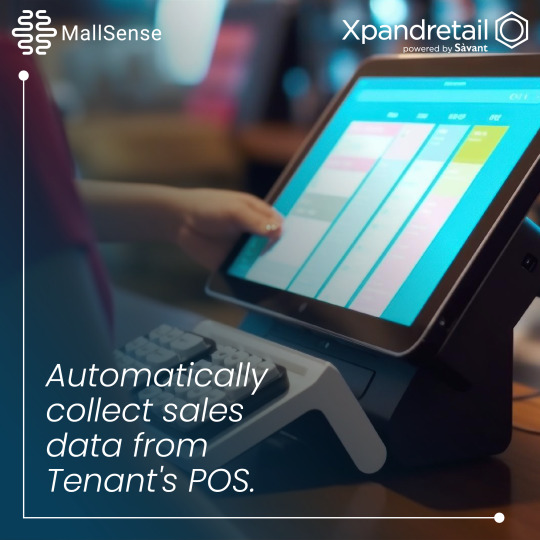
#SalesDataCapture#Retail#DataAnalytics#Xpandretail#RetailTech#Innovation#FootfallAnalytics#BusinessIntelligence #mallsense#sàvantdatasystem#retaildata#MallSense#gulf#uae#kuwait#bahrain#oman#qatar#ksa#gcc
1 note
·
View note
Text
Sales Data Capture - Xpandretail
Maximize your mall's performance with Xpandretail Sales Data Analytics System. Our AI-based solution automatically collects and analyze tenants sales data from POS without any hassle.
Visit us at: https://xpandretail.com/sales-data-capture/
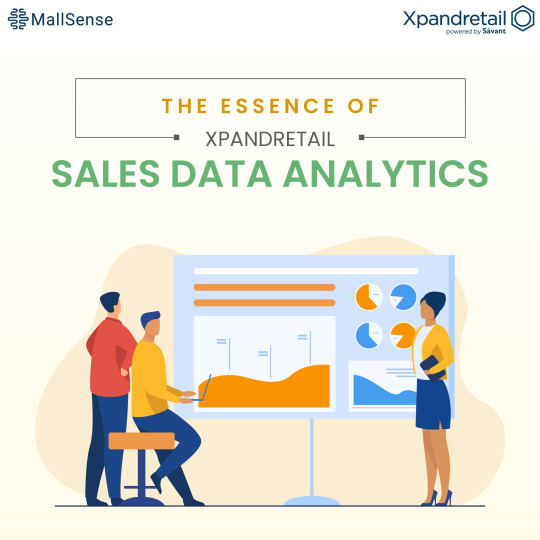
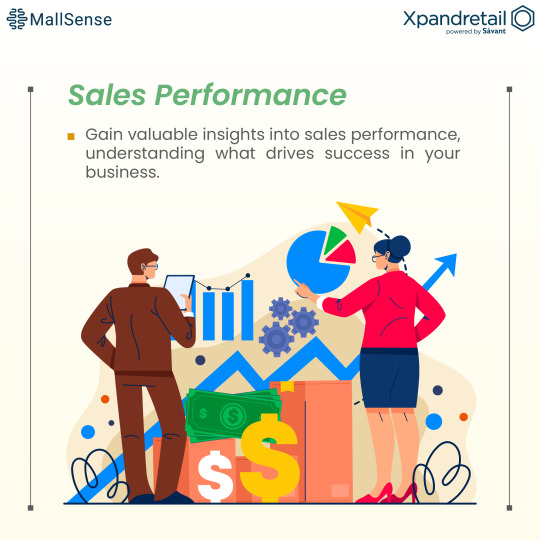
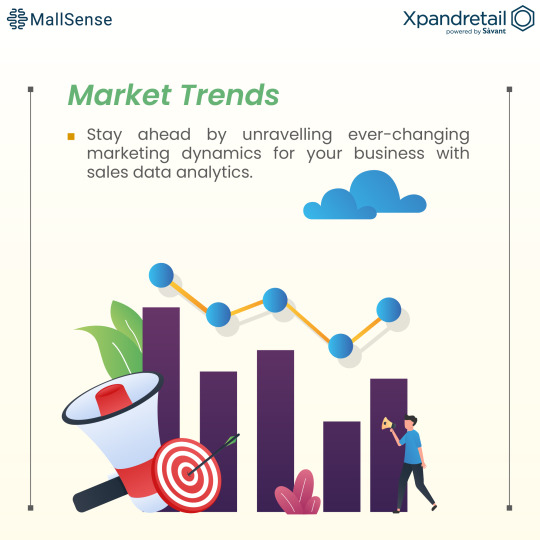
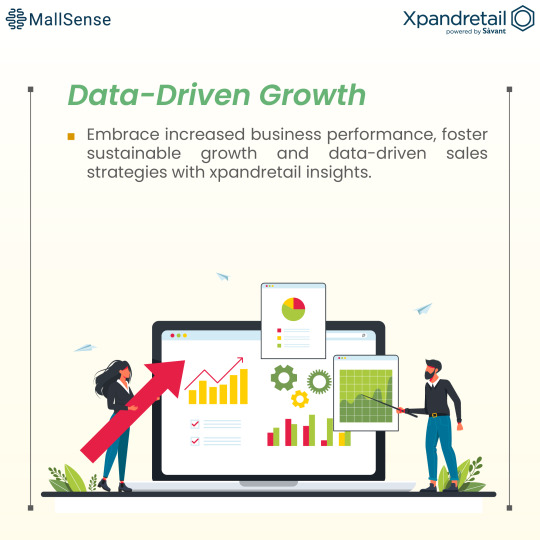
#SalesDataCapture#Retail#DataAnalytics#AI#Xpandretail#FootfallManagement#FootfallAnalytics#sàvantdatasystem#retaildata#peoplecountingsystem
0 notes
Text
People Counting Solutions for Retailers - Xpandretail
Understand customer behaviour pattern through Footfall and tracking hotspots with our AI-based people counting solutions.
Xpandretail - Powering Businesses with Tomorrow’s Data.
Click to know more: https://xpandretail.com/people-counting/
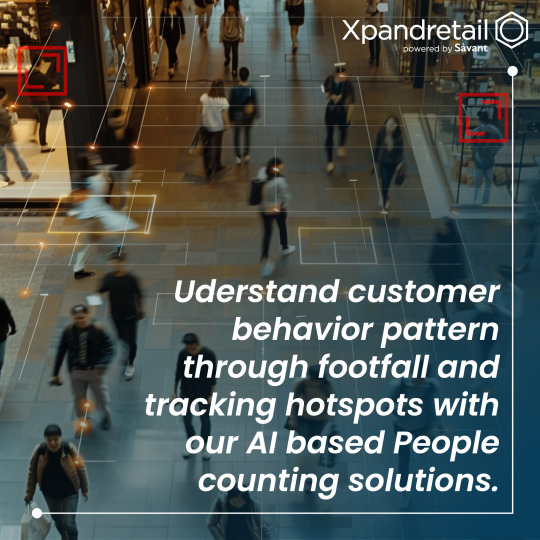
#Retail#DataAnalytics#AI#Xpandretail#FootfallManagement#Partnership#SuccessStory#FootfallAnalytics#sàvantdatasystem#retaildata#peoplecountingsystem
1 note
·
View note
Text
Another milestone achieved.
Another milestone achieved. Team Xpandretail extends a heartfelt thank you to EK Kanoo Group in Bahrain for choosing us as their data analytics partner.
Thank you to our dedicated team for their hard work and to EK Kanoo Group for trusting us to drive success together.
Xpandretail - Powering Businesses with Tomorrow's Data.
Visit us at: https://xpandretail.com/people-counting/










#Xpandretail#DataAnalytics#AI#Partnership#SuccessStory#FootfallAnalytics#BusinessIntelligence #sàvantdatasystem#retaildata#peoplecountingsystem
1 note
·
View note
Text
Xpandretail
Ace your retail game with Xpandretail's advanced Data Analytics Solutions.
Ready to revolutionize your retail business.
With Xpandretail's AI-based Data Analytics Solutions, you can ace your retail game and stay ahead of the curve. Accelerate your retail success with detail.
Learn more at Xpandretail - https://xpandretail.com/people-counting/
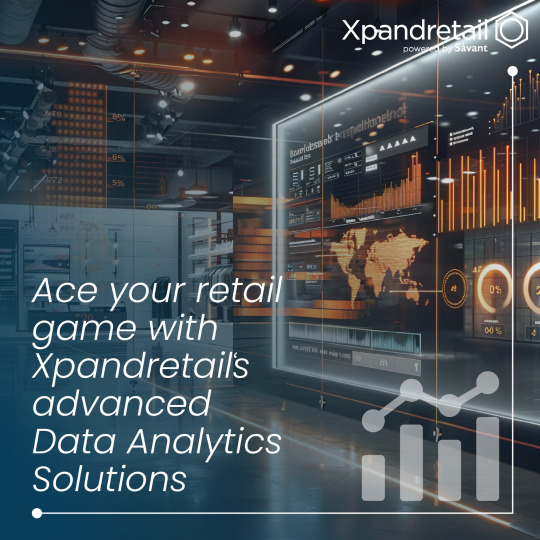
#Retail#DataAnalytics#Xpandretail#RetailTech#Innovation#FootfallAnalytics#BusinessIntelligence #sàvantdatasystem#retaildata#peoplecountingsystem
0 notes
